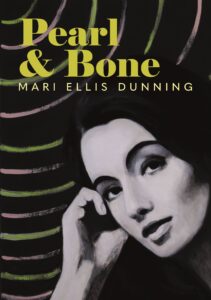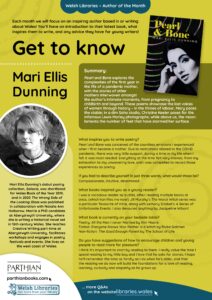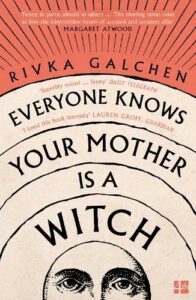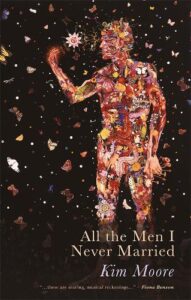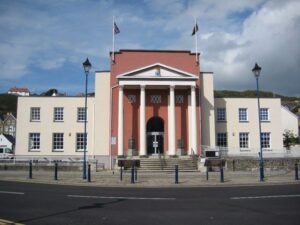Mari Ellis Dunning
November 1, 2022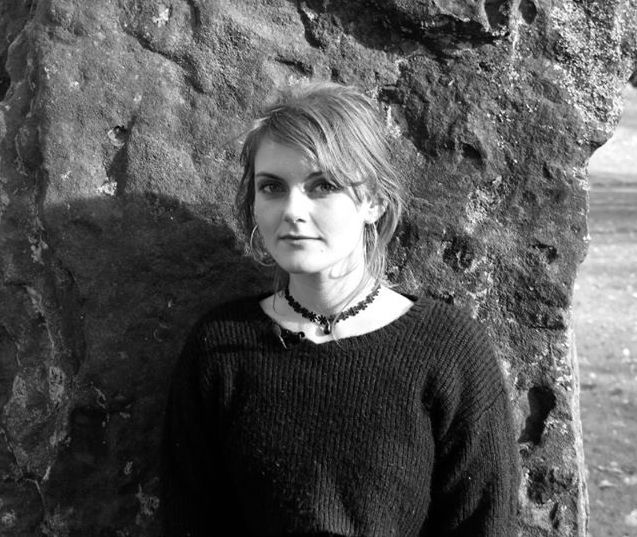
Her new poetry collection Pearl and Bone explores the complexities of the first year in the life of a pandemic mother, with the stories of other mothers interwoven amongst the author’s intimate moments, from pregnancy to childbirth and beyond. These poems showcase the lost voices of women through history – in the throes of labour, Mary paces the stable; in a dim Soho studio, Christine Keeler poses for the infamous Lewis Morley photographs; while above us, the moon laments the number of feet that have stormed her surface.
Beautiful, emotional and richly imagistic, Mari Ellis Dunning presents mothers in many forms: those experienced, chosen, unwitting, and presumed, asking us to consider the true nuances of motherhood – delicate as pearl, durable as bone. Shortlisted for Wales Book of the Year for her debut collection Salacia, this is the poet’s highly anticipated second collection.
Thank you Mari for agreeing to answer a few questions for us… tell us a little about your poetry collection …
Pearl & Bone is a collection I started writing after the birth of my first child, which happened at the height of the COVID-19 pandemic amidst a lockdown. Becoming a mother for the first time brought masses of inspiration, and gave me pause to reflect ‒ I wanted to record everything, from the physical changes I underwent to my emotional state. The way mothers and new parents were sidelined during the COVID restrictions felt to me like part of a much larger issue around the marginalisation of women’s issues, particularly in healthcare, and that part of my journey into motherhood fed into other narratives within the collection, surrounding reproductive rights and violence against women. Eventually, the collection became a body of work about women, their roles, and their power.
What do you hope readers will take away after reading the book?
I want them to be angry. To be outraged. To be horrified at the way women have been repeatedly cast aside, hunted, discriminated against and silenced over centuries. The poems set out to address some injustices, from the way Christine Keeler was hounded by the media for her role in the Profumo Affair, to the recent reversal of reproductive rights across the USA. But I also want readers to find hope ‒ writing this book was my way of processing some of these difficult events, so there’s compassion and empathy and solidarity to be found too.
What inspires you to write poetry?
The book was conceived of the countless emotions I experienced when I first became a mother. Due to restrictions related to the COVID pandemic, there was very little support, during a time in my life when I felt it was most needed. Everything at the time felt very intense, from my exhaustion to my unwavering love, and I was compelled to record those experiences as poetry.
What, in your opinion, are the most important elements of good writing?
This is always a tricky question. When I’m grading university assignments, we have a criteria to follow, but creative writing is a nuanced business. For me, a good piece of writing should always make the reader feel something, whether that’s empathy, joy, sadness, anger, or something else. Strong imagery is an important element of poetry ‒ I like to see imagery that makes me stop and think twice. A tell-tale sign of an effective piece of writing is when it stays in your mind beyond the reading. Poetry can be haunting like that.
If you had to describe yourself in just three words, what would those be?
Compassionate, intuitive, determined.
What books inspired you as a young reader?
I was a voracious reader as a child, often reading multiple books at once, (which horrifies me now!) Jill Murphy’s The Worst Witch series was a particular favourite of mine, along with Lemony Snicket’s A Series of Unfortunate Events. I also devoured anything by Jacqueline Wilson!
What book is currently on your bedside table?
Poetry: All the Men I never Married by Kim Moore
Fiction: Everyone Knows Your Mother is a Witch by Rivka Galchen
Non-fiction: The Good Enough Parent by The School of Life
If you could invite any three people for dinner, whom would you invite?
Greg James, because he’s just so much fun on the radio! He lightens the mood and plays silly games and I think that’s really important sometimes. Louis Theroux because he’s great and why wouldn’t anyone want him at a dinner party!? He’s met so many interesting and diverse people, he’d have countless stories to tell. And finally, Imogen Hermes Gower, because I recently took part in a series of workshops with her about writing historical fiction, and she was kind, generous with her time and insightful ‒ I’m working on a historical novel as part of my PhD and I’d love to just keep bouncing ideas around with her.
In what way have libraries influenced you during your lifetime?
When I was little, I used to go to the local library to take out various books. Then as a teenager I’d often use the library computers, usually for social media (these were the days of Bebo!) The university library was a source of information and research throughout my studies, as well as a place of refuge to read and write. Aberystwyth town library became a place of comfort for me when I first moved back there as an adult, and was working from home. At the time, my mental health was very poor, and it was important for me to get out of the house every day. The library gave me somewhere I could go, where I was warm, able to work or write, and be surrounded by people. When I was pregnant with my son, I looked forward to playgroups and story sessions at the library, but unfortunately COVID put a stop to that so we didn’t get to go.
Do you have suggestions of how to encourage children and young people to read more for pleasure?
I think it’s important to start by reading to them. I really value the time I spend reading to my little boy and I love that he asks for stories. I hope he’ll remember the time as fondly as I do when he’s older, and that the reading we do now will build the foundations for a love of reading, learning, curiosity and empathy as he grows up
Pearl & Bone was published in October 2022 by Parthian Books (Twitter @parthianbooks)
Read our Get to Know the Author flyer for further information about the author.
See our previous Authors of the Month writing in English.

